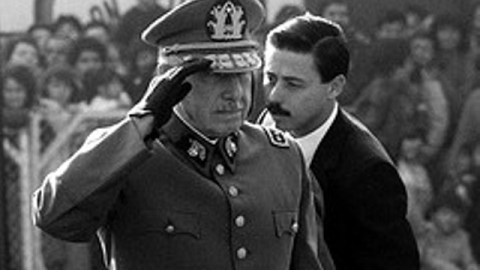Chile: Exorcising The Ghost Of Pinochet

BY delicious irony, the local Member of Parliament for the impoverished Atacama region of Chile – which includes the doomed mine of San Jose – is none other Isabel Allende. Allende is the daughter of the late President Salvador Allende, who put a revolver to his head in the final hours of the August 1973 coup d’etat, which toppled the World’s first, and only, elected Marxist head of State. That coup, which Henry Kissinger famously reported to Richard Nixon with the words; “we didn’t do it… but we helped them do it”, paved the way for decades of brutish dictatorship under General Pinochet.
This week, a momentous week full of human drama, as thirty three miners were slowly winched out of their underground prison by a capsule that might have done service in a Star Trek movie, has done wonders for the people of Chile and wonders for the international reputation of their country. For the first time in a very long time there is a real mood of national pride, that despite the almost impossible odds, Chileans performed the miracle so many of its devout Catholic worshippers had been praying for. But more profound still is the knowledge that this South American State may at last have thrown off the shackles of the recent past and may yet come to be remembered as the country that rescued its miners, rather than the place where democracy was forcibly replaced by the dictatorship of Pinochet.
For Pinochet cast a shadow long after he was forced to stand down in 1990. The families of the disappeared kept up their vigils, even as Pinochet continued his political afterlife commanding Chile’s armed forces. His economic legacy of extreme wealth alongside extreme poverty lingered, as did the national and international attempts to bring him to justice that finally culminated in the old dictator being briefly kept under a form of house arrest near a golf course in southern England. It also underscored all that anyone knew about a country that was far away and of which, in truth they knew very little.
Chile’s current President, billionaire businessman, Sebastian Pinera, had the very good sense to be there as the first miners broke to the surface, to receive the hugs of the grateful men, to be there even to receive a piece of rock one of the miners had brought with him from the pit bottom. He has had the better sense to announce that the San Jose mine will never re-open, and has made a bold promise that “safety first” will be the watchword for the industry. With a sharp media eye, he has invited the miners to play his staff in a football match – the winners getting the run of the Presidential Palace for a while. Having reported from underground in the coal mines of Polish Silesia and Outer Mongolia, and seen the conditions under which miners work, I suspect that mining communities around the World will wonder if the President’s conversion to safe mining practices really does mark a turning point. Be that as it may, for most Chileans this is a World Cup victory moment.
Other countries and peoples can only hope for such a seismic piece of national good news to begin to overturn decades of entrenched attitudes. This week marks the opening of the first post War exhibition devoted to another dictator, Adolf Hitler in Berlin’s Cultural Museum. But even here, over Sixty years since the Fuhrer committed suicide in the burning ruins of the capital of his ‘thousand year Reich’, the organisers are treading carefully. The exhibition is diplomatically titled “Hitler and the Germans: Nation and Crime”. They say they will not display Nazi uniforms – partly because this is still illegal in Germany, but also because they don’t want to attract young Neo Nazis. Post war German history is full of mighty triumphs that took place in spite of the scorched earth policies of the Nazis in their final, dying, days. The heroic Berlin Airlift and the struggle of the West Berliners for their freedom; the great post war economic miracle of Western Germany, the triumph of unification – all of these should be enough surely to draw a line finally under Hitler? Not quite. After the Berlin Wall came down and the great expanse of the Potsdamer Platz could finally be re-developed, great care was made to finally bury Hitler’s ruined bunker forever. When a few years later a giant Swastika was spotted in the form of judiciously planted Larch trees in a forest in eastern Germany, the offending trees were immediately felled. There are – despite the passage of time – very deep sensibilities that remain. There are also unnerving entrenched attitudes amongst a minority – one out of ten Germans in a recent poll professed to wanting a “Fuhrer” figure, while 35% of respondents said that there were “too many foreigners in Germany”. In sentencing the Nazi Deputy Leader, Herman Goering in 1945, the Nuremburg Judge said of him; “Your crimes are unique in their enormity”. It is the enormity of war time Germany’s crimes against the Jews and the Slavs that will echo down the years, long after Pinochet has become a dim and dusty memory.
So what then of a more recent example – the Baathist dictator of Iraq, Saddam Hussein? In essence the borders of that oil rich state were artificially created to ensure the country remained weak and divided, the sort of geographic construct that would inevitably require a strong man to keep it all together. Saddam, like Pinochet, was a home grown despot, but unlike Pinochet – or the more seriously evil and destructive Hitler, was a tribal leader deeply rooted in the sizeable minority Sunni. His adventurism and old fashioned brutality coupled with his venality ensured that his removal by the Americans was accompanied by widespread relief. And yet the years of turmoil and near civil war that have followed has left many Iraqis hankering back to the good old days when the lights came on, the water ran and there were first class hospitals in Baghdad. It will take more than a miraculous future rescue of trapped Iraqi oil workers to change the outside World’s perception that Iraq remains a dangerous place, or that there is not another Saddam simply waiting in the wings.
And while Chile may have finally turned the page on Pinochet, there will always be those who hanker for the certainties and comparative security that frequently comes with authoritarianism. Just as there are Muscovites who still parade with their Stalin banners in front of the Kremlin, or Beijing taxi drivers with their Chairman Mao pennants, there will be those who worship at the shrine of Pinochet. For those – the majority – who believe that despite the failings of democratic institutions, real freedoms are worth battling for, the old maxim that ‘vigilance is the eternal price of freedom’, is something worth hanging on to.
Oddly enough that is a slogan that has often featured on miners’ union banners the World over.





